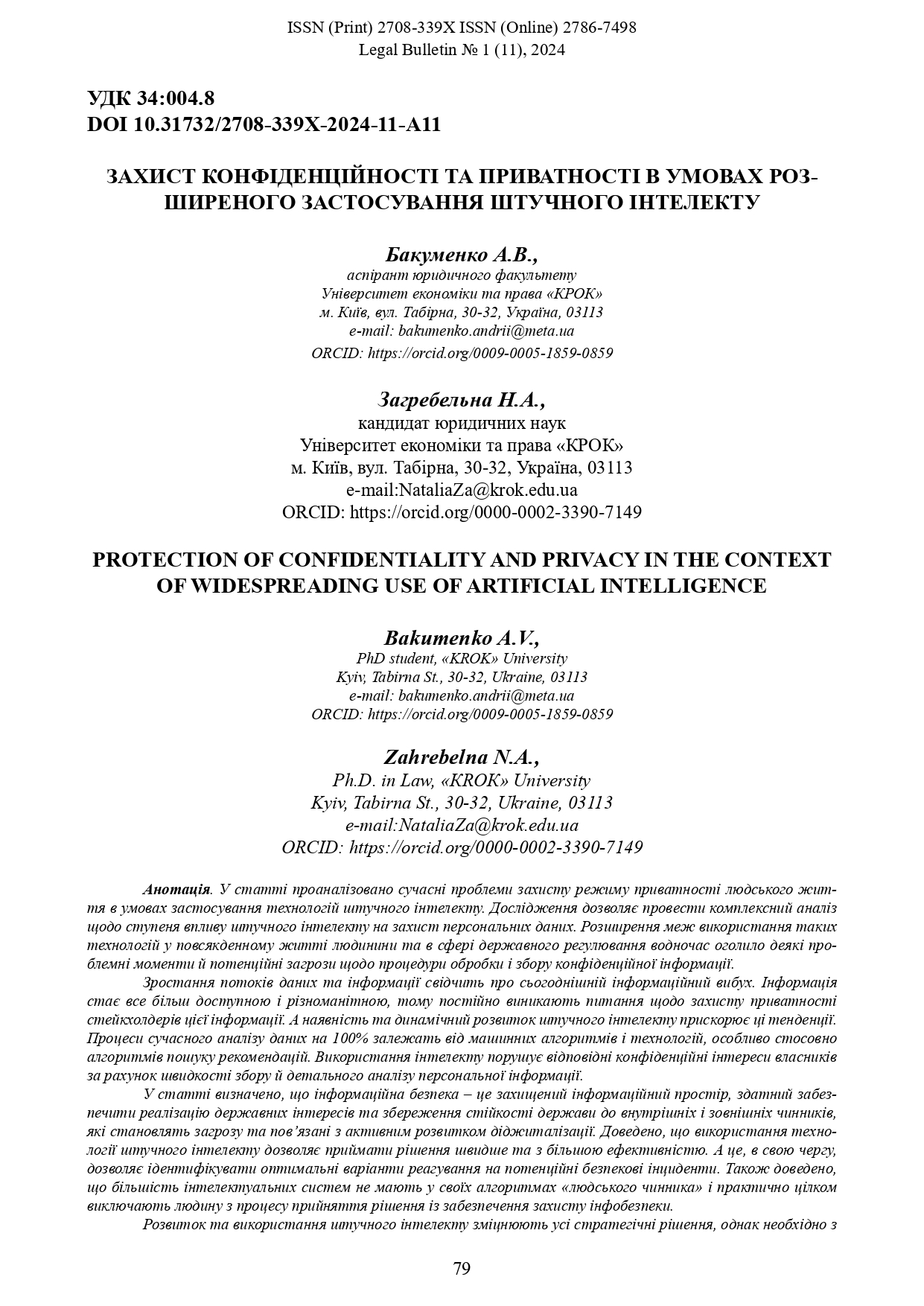PROTECTION OF CONFIDENTIALITY AND PRIVACY IN THE CONTEXT OF WIDESPREADING USE OF ARTIFICIAL INTELLIGENCE
DOI:
https://doi.org/10.31732/2708-339X-2024-11-A11Keywords:
artificial intelligence, confidentiality, privacy, personal data, information security, human rights and freedomsAbstract
The article analyzes the current problems of protecting the privacy of human life in the context of artificial intelligence technologies. The research allows for a comprehensive analysis of the degree of AI’s impact on personal data protection. The expansion of the use of such technologies in everyday human life and in the sphere of government regulation has exposed certain problematic issues and potential threats to the process of processing and collecting confidential information. The increase in data and information flows indicates today’s information explosion. Information is becoming increasingly accessible and diverse, which raises constant questions about the privacy protection of stakeholders of this information. And the presence and dynamic development of artificial intelligence accelerate these trends. Modern data analysis processes are 100% dependent on machine algorithms and technologies, especially regarding recommendation algorithms. The use of AI disrupts the corresponding confidential interests of owners through the speed of data collection and detailed analysis of personal information. The article defines information security as a protected information space capable of ensuring the realization of state interests and the preservation of the state’s resilience to internal and external factors that pose a threat and are related to active digitalization. It has been proven that the use of artificial intelligence technology allows for faster and more efficient decision-making, which, in turn, enables the identification of optimal responses to potential security incidents. It has also been demonstrated that most intelligent systems do not have a «human factor» in their algorithms and practically exclude humans from the process of decision- making in ensuring information security. The development and use of artificial intelligence strengthen all strategic decisions, but caution must be exercised in its unconditional use to satisfy the needs and interests of all stakeholders regarding information security. Decision-making using AI technologies helps identify threats, prevent risks, and take appropriate actions. Furthermore, artificial intelligence and machine learning methods play a crucial role in improving information security protocols.
References
Artificial Intelligence and Privacy – Issues and Challenges. URL: https://ovic.vic.gov.au/privacy/resources-for- organisations/artificialintelligence-and-privacy-issues-and-challenges/#conclusion (дата звернення: 07.02.2024).
Про захист персональних даних: Закон України від 01.06.2010 No 2297-VI /ВРУ. URL : https://zakon.rada.gov.ua/ laws/show/2297-17#Text (дата звернення: 07.02.2024).
Долян І. В., Тимошенко Є. А. Правове регулювання використання систем штучного інтелекту в смарт сіті. Юридичний науковий електронний журнал. 2021. No 11. С. 525-528.
Косілова О. І., Солодовнікова Х. К. Права і свободи людини і громадянина V.S. Штучний інтелект: проблемні аспекти. Інформація і право. 2020. No 4(35). С. 56-66.
Гуржій Т. Інформаційне право: виклики гібридної війни. Зовнішня торгівля: економіка, фінанси, право. 2018. No 4. С. 16-26.
Концепція розвитку штучного інтелекту в Україні: Розпорядження Кабінету Міністрів України No 1556-р від 02.12.2020. URL: https://zakon.rada.gov.ua/laws/show/1556-2020-%D1%80#Text (дата звернення: 07.02.2024).
Ніщименко О. А. Інформаційна безпека України на сучасному етапі розвитку держави і суспільства. Наше право. 2016. No 1. С. 17-23.
Укроборонпром хоче використовувати штучний інтелект в «оборонці». URL: https://www.epravda.com.ua/ news/2021/08/26/677230 (дата звернення: 07.02.2024).
Буров М. Хто несе відповідальність за помилки штучного інтелекту? URL: http://uz.ligazakon.ua/ua/magazine_ article/EA012676 (дата звернення: 07.02.2024).
Бисага Ю. М., Бєлов Д. М., Заборовський В. В. Штучний інтелект та авторські і суміжні права. Науковий віс- ник УжНУ. Серія «Право». Вип. 76(2). Ч.2. 2023. С. 299-304.
Бисага Ю. М., Бєлова М. В. Виклики для прав дитини у зв’язку з розвитком штучного інтелекту. Науковий вісник УжНУ. Серія «Право». Вип. 77. Ч. 1. 2023. С. 90.

Downloads
Published
How to Cite
Issue
Section
License
Copyright (c) 2024 Бакуменко А.В., Загребельна Н.А.

This work is licensed under a Creative Commons Attribution 4.0 International License.




